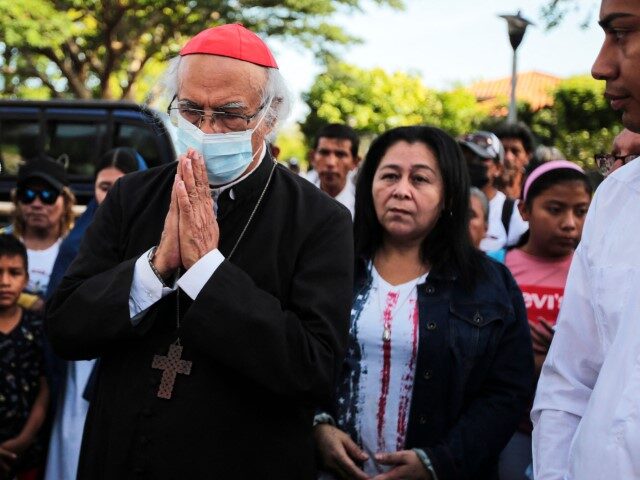Local and international journalist groups demanded the release of Nicaraguan reporter Victor Ticay this weekend after communist authorities arrested him on Thursday for covering a traditional Catholic procession.
The Journalists and Independent Communicators of Nicaragua (PCIN) organization and the Committee to Protect Journalists (CPJ) demanded Ticay’s immediate liberation after Sandinista authorities detained him in his town of Nandaime on Thursday for publishing images of a Holy Week procession. Catholics, and most Christians, observe Holy Week in the spring to mark Jesus’s crucifixion (on Good Friday) and resurrection (on Easter). Holy Thursday is observed as the day in which Jesus attended the Last Supper, the event Ticay covered occurred on Wednesday.
The regime of communist dictator Daniel Ortega declared a “war” against the Vatican in September and has dramatically increased its persecution of the Catholic church in the country since 2022. The regime banned the Nicaraguan Catholic Church from celebrating outdoor Holy Week processions this year alleging “security reasons,” allowing clergy to only conduct processions inside the premises of their churches or in the atrium of the parishes.
Ticay, who works as a reporter for the Nicaraguan TV channel Canal 10, covered a Holy Week procession known as La Reseña in Nandaime on Wednesday, posting the video on his Facebook page La Portada (“The Front Page”), which covers local news. Nicaraguan police forces reportedly arrested Ticay on Thursday for having covered the activity.
#Nandaime #Reseña
Posted by La Portada – Nandaime – Nicaragua on Wednesday, April 5, 2023
La Reseña is a centuries-old traditional Holy Week procession celebrated in Nandaime where young people gather at the local Catholic church wearing cassocks and masks, often carrying crosses and ladders. The group then walks through the streets of the city to mark the route for the town’s Holy Thursday and Good Friday processions before heading back to the church. In 2019, the activity was expanded by adding a tour to the local cemetery to visit the graves of ancestors who had engaged in the marches as a sign of respect by the current generation.
Through an official statement posted to its Twitter account on Saturday, the Journalists and Independent Communicators of Nicaragua (PCIN) organization denounced Ticay’s arrest as a repressive measure and criminalization of his journalistic work. The group demanded his immediate release.
PCIN detailed that police took Ticay out of the local police station and imprisoned him in the Evaristo Vásquez Police Complex in Managua, the national capital.
“PCIN calls for the right to inform and [for] freedom of the press, while demanding that the regime of Daniel Ortega and [Vice President and First Lady] Rosario Murillo put an end to the violence against men and women journalists and its policy of official censorship that prevails in the country,” the statement concluded.
Similarly, the Committee to Protect Journalists (CPJ) denounced the arrest of Ticay on Friday, stating that Nicaraguan authorities should immediately release him and cease detaining members of the press for their work.
“The Nicaraguan government has once again shown little respect for the right to freedom of expression amid an absurd climate of total censorship, which extends even to religious activities,” CPJ Program Director Carlos Martínez de la Serna said. “Authorities must release journalist Victor Ticay at once and cease their relentless campaign to intimidate and threaten the press into silence or exile.”
Monitoreo Azul y Blanco (Blue and White Monitoring), an NGO that tracks human rights violations in Nicaragua, reported on Thursday that the Ortega regime carried out at least 35 human rights violations — including 15 reported arbitrary detentions and five acts of harassment — against dissidents, members of the Catholic Church and its parishioners, journalists, and local activists during this year’s Holy Week.
The Ortega regime also banished Panamanian Catholic priest Donaciano Alarcón from the country after accusing him of performing an “unauthorized” Holy Week procession on April 3. Regime authorities reportedly took Alarcón to the border with Honduras, expelling him from the country.
“They put me in a patrol car with two policemen and took me to the border [with Honduras] and there they made me cross and told me: you are out of the country and can no longer return,” Alarcón said in an interview with the Archdiocese of Panama’s Radio Hogar.
Christian K. Caruzo is a Venezuelan writer and documents life under socialism. You can follow him on Twitter here.

COMMENTS
Please let us know if you're having issues with commenting.